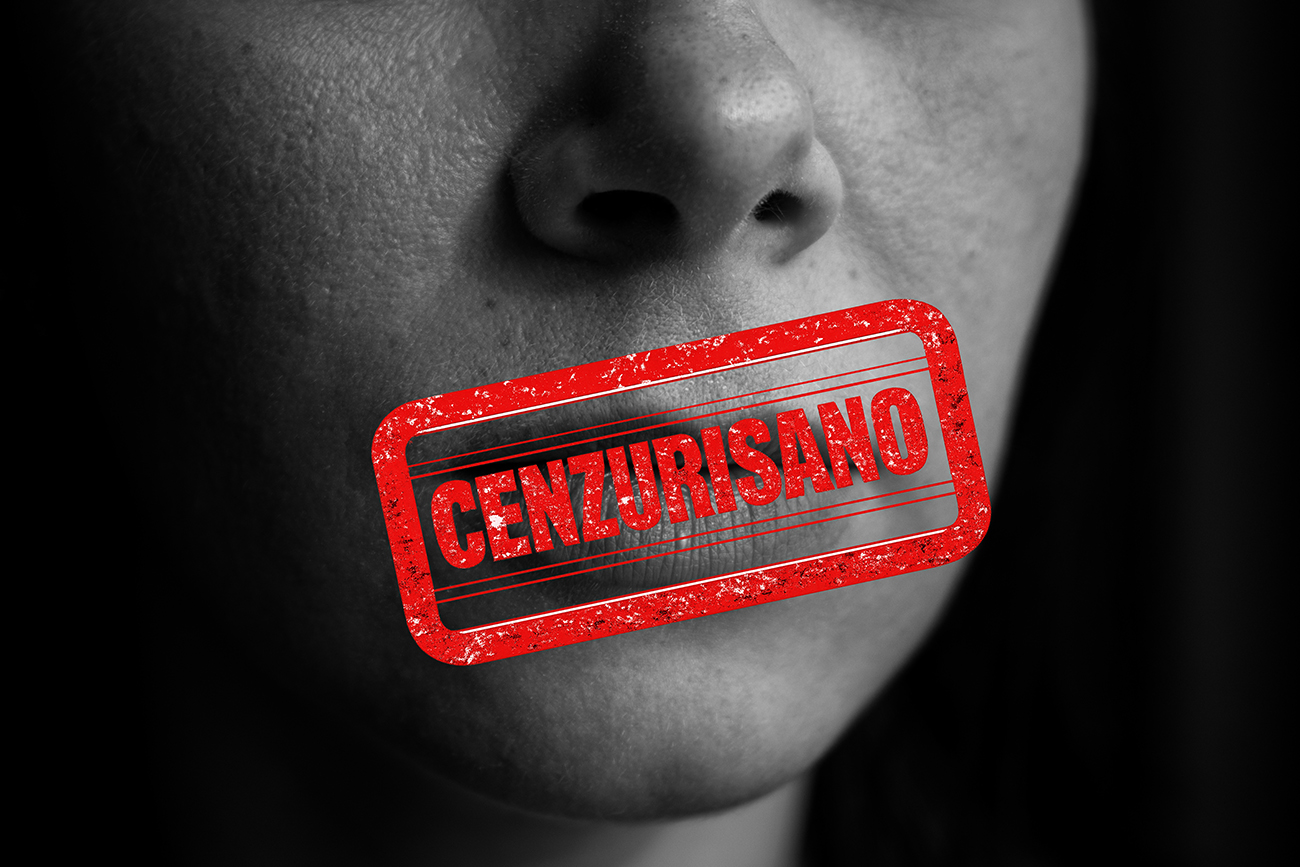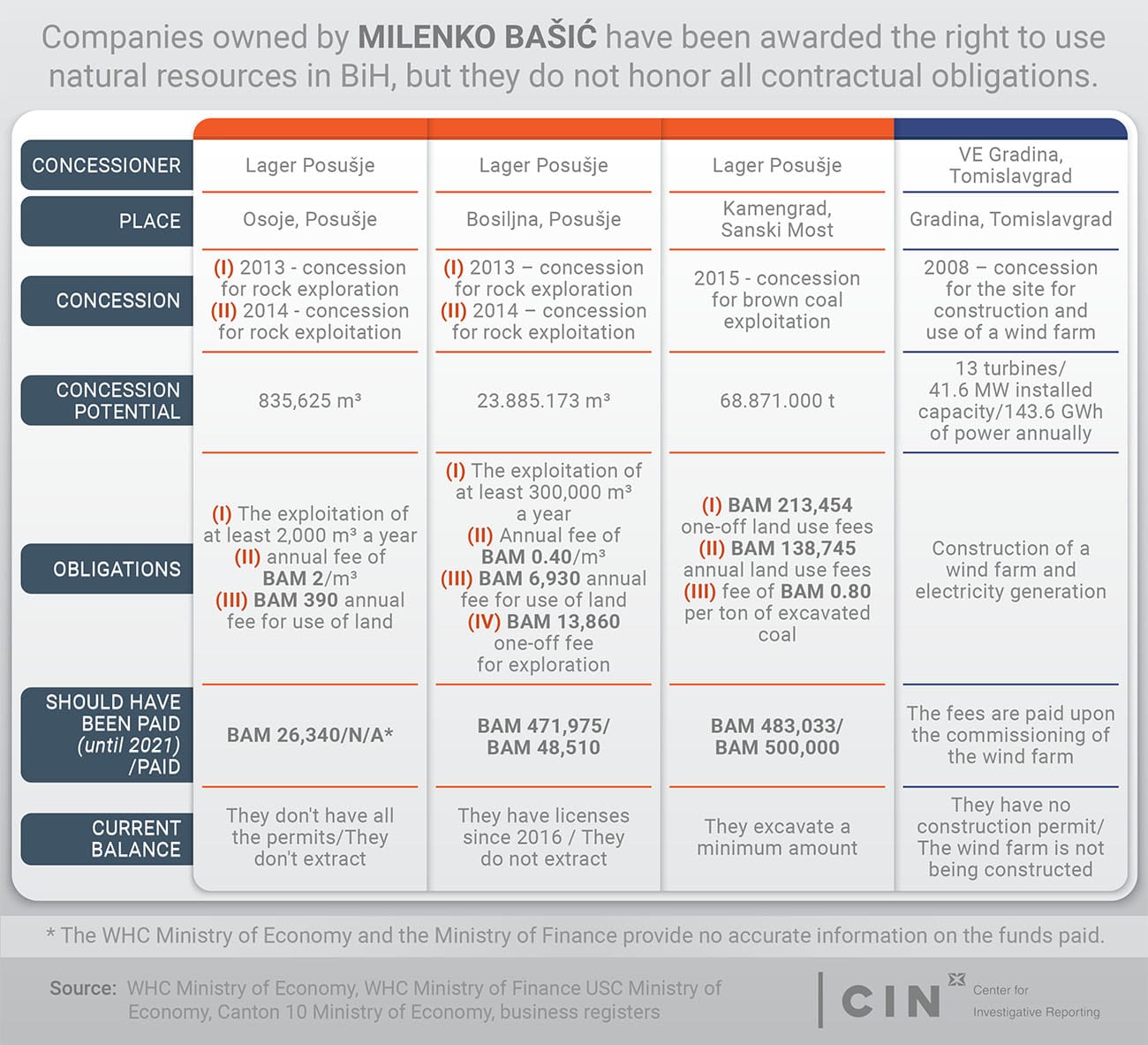Beneath the Herzegovinian land in Bosiljna near Posušje, there are mineral resources – white limestone used for the production of paper, paints, glues, plastics, and even medicines. Local company Lager, owned by Milenko Bašić, was granted the right to exploit it.
Bašić planned to earn four million marks a year from this job. He could earn additional millions quarrying at another location in Posušje, mining brown coal in Sanski Most, and operating a wind farm in Tomislavgrad, because his companies have concessions for these jobs as well.
The documentation shows that the government institutions favored Lager in granting these concessions. This company won some of the contracts, although it did not satisfy the conditions or previous obligations. In the Una-Sana Canton, they had their concession fees reduced, while in the West Herzegovina Canton (ZHK), they were granted a payment deferral.
“These people are as strong as the state. I wish we had a hundred companies such as ‘Lager’ in the canton”, says Hasan Bajrektarević from the USC Ministry of Economy, which awarded one of the concessions.
Although he made a lot of promises, he does not pay concession fees regularly – instead of the one million BAM he should have paid so far, only half of that money landed on the budget accounts. The two quarries are out of operation, the volume of coal from the mine is fewer than anticipated, and the wind farm is yet to be built.
The struggle to change the contract on Bosiljna
Lager from Posušje was a dealer and seller of construction machinery and then began to engage in mining.
In June 2013, the company was awarded a one-year concession for the exploration of rock in Bosiljna near Posušje, and the following year they were granted the concession to exploit it. At that time, they estimated that nearly 24 million cubic meters of white stone are located at that site, which could bring them an annual profit of around 4 million marks.
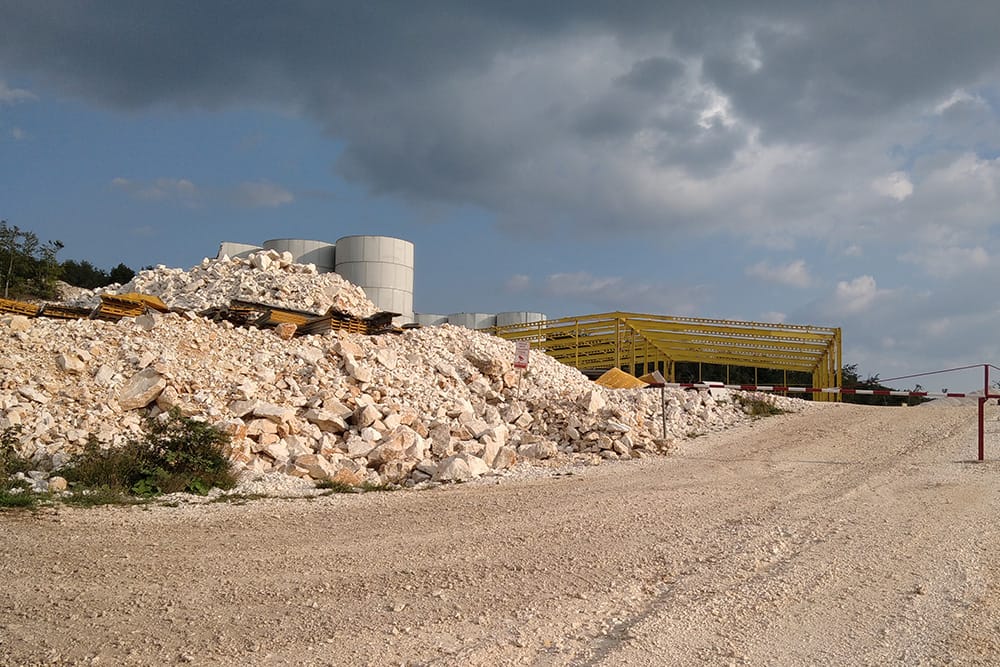
At a public tender, Lager offered the Government of the West-Herzegovina Canton to quarry 300,000 cubic meters of stone a year and pay 0.40 BAM in fees for each cubic meter extracted. The canton could thus count on an annual income of BAM 120,000. They also agreed to pay an additional BAM 6,930 in fees for the use of land in the exploitation area, regardless of whether the contracted amount of stone was actually quarried or not.
Their bid was at least four times better than the bids of competing companies Dravel and Mineralne sirovine. They [competitors] offered to pay higher concession fees of BAM 0.43 and BAM 0.50 respectively, but estimated a smaller volume of excavation – 45,000 and 60,000 cubic meters respectively – so the ZHK government chose Lager because, on the paper, they promised the best benefits.
In August 2014, they signed a concession agreement awarding the right to Lager to exploit white stone until 2043, and binding them to pay concession fees.
Two years after the signing, Lager approached the ZHK Government with the first request to amend the contract. They claimed that they could not extract the contracted amount because they were late with the works due to problems with the excavation permit and that in the meantime they had lost a potential partner and suffered financial damage.
The Cantonal Government granted them a payment deferral for the fee for the excavated rock until they obtain the permit, which they obtained at the end of December 2016. However, the Cantonal Attorney’s Office denied their requests to postpone the payment of the fee for the use of exploitation land and to reduce the volume of excavation from 300,000 to 70,000 cubic meters. If granted, this would have reduced the annual fee to BAM 28,000 – by more than four times.
Ms. Gordana Nenadić, attorney general, warned the ZHK Government that in that case, Lager’s bid would no longer be the best choice for the Canton.
She explained that for such large changes to the contract, the public tender would have to be repeated or other bidders would have to be notified of the changed circumstances, especially because the exploitation had not even started.
Lager representatives insisted that the Attorney General’s Office give the go-ahead for amendments to the contract. They were coming to the talks and initiating joint meetings with Cantonal Prime Minister Zdenko Ćosić, but the attorney Nenadić maintained her position.
“You can’t ask for things that are beyond the law,” she says.
The views and arguments of the Attorney General’s Office prevented the signing of the annex to the contract, confirmed Prime Minister Ćosić.
Although in late 2016 Lager obtained all work permits and installed silos for processing, it never started quarrying the stone.
“Obviously, the concessionaire still has no interest in starting exploitation,” says the cantonal mining and geological inspector, Jakov Konta.
Illegal excavation at Osoja
Inspector Konta has previously inspected Lager’s affairs. In March 2014, he stopped their activities at a quarry in Osoje near Posušje because they were quarrying without a work permit.
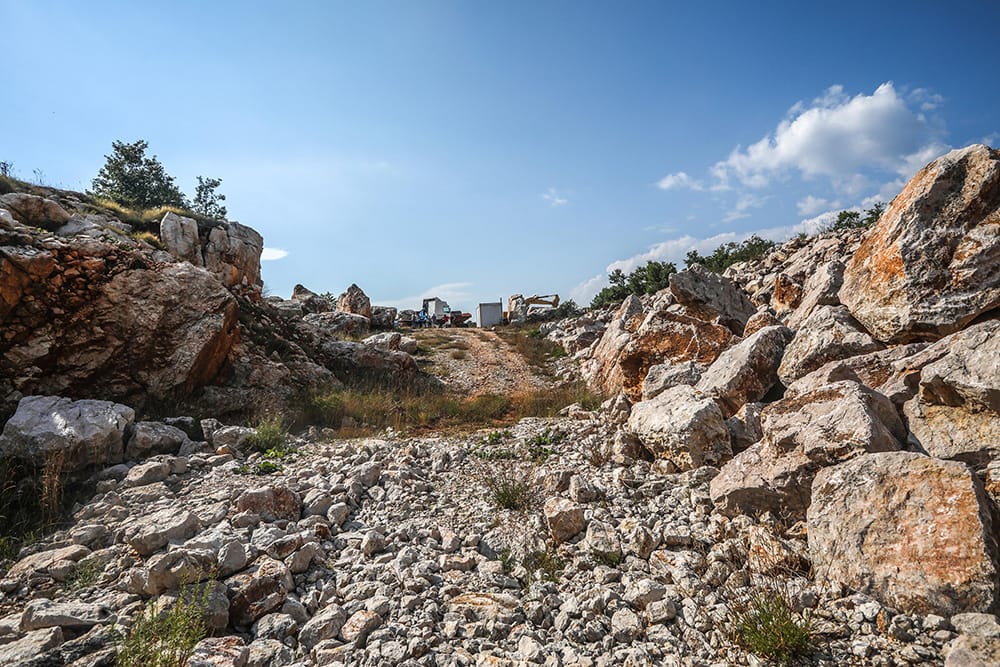
Lager had a concession for exploration at this location awarded by the ZHK Ministry of Economy. However, they did not have the necessary exploration permit, without which they were not even allowed to start the works.
“The exploration permit was never obtained,” says Inspector Konta, who informed the relevant ministry about the shutdown.
Despite the inspection ban, Bašić’s company started excavation and quarrying, and in April 2014 it informed the Ministry that the exploration works had been completed, thus satisfying the condition for signing the quarrying concession.
Already in May, Lager’s representatives signed an agreement with Prime Minister Ćosić for the extraction of 2,000 cubic meters per year until 2043. For each cubic meter of extracted material, they have to pay BAM 2 in addition to an annual fee of BAM 390 for the use of excavation land.
At this location, there are 835 thousand cubic meters of stone, which could reach a price of up to BAM 500 per cubic meter, depending on the quality.
It is not clear to Inspector Konta how Lager got the contract for exploitation, considering that they did not have an exploration permit.
“They were awarded a concession contract for exploitation (…) but again they could not do any works. Because my decision, that is, the inspector’s decision banning the works stands until they obtain an exploration permit”, says Konta.
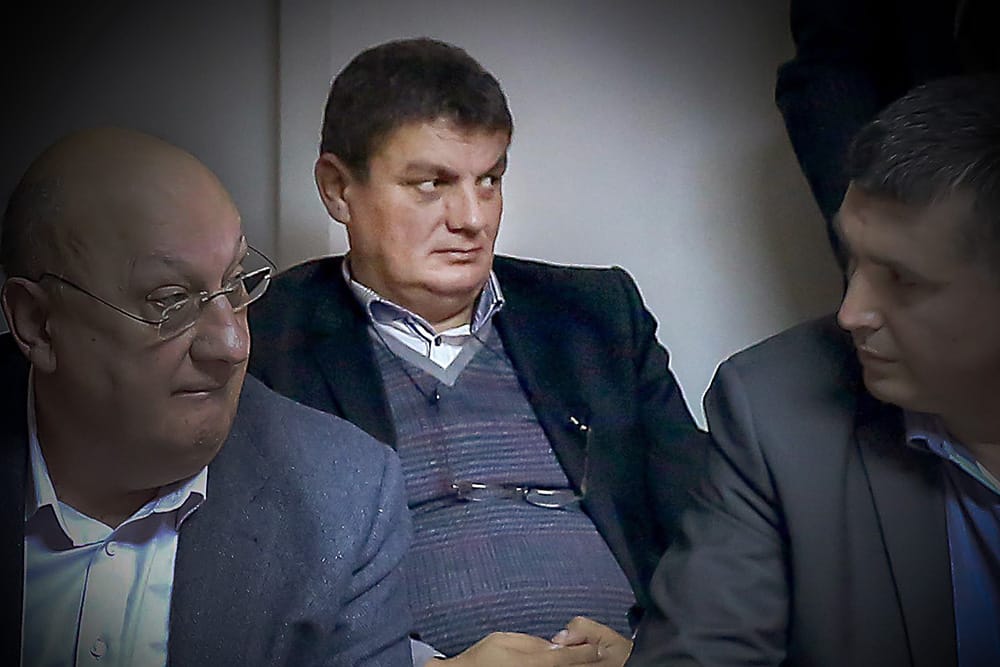
Milenko Bašić asked Konta to revoke the ban. He phoned him, sent him messages, which the inspector forwarded to the Ministry of the Interior and the Prosecutor’s Office.
Since they started quarrying in a place that was not planned for the quarry and since the residents were not informed about it, the residents of Osoja rose up in revolt. They sent several urgencies to the competent institutions and started legal actions, which ultimately, among other things, led to the environmental permit granted to lager for this quarry being revoked.
Lager should have paid by now about BAM 560,000 in fees for exploration and exploitation of stone in Bosiljna and Osoje, but they paid only BAM 82,000. This could have been the basis for terminating the contract, but it did not happen.
The government exempted them from paying half of the annual concession fee for Bosiljna in 2020, that is, BAM 63,463, while it sued them for the remaining part of the debt. According to the first-instance judgment rendered by the Široki Brijeg Municipal Court, Lager’s debt amounts to BAM 120,000, which is the amount based on invoices from 2017 and 2018 received from the competent Ministry, said Gordana Nenadić from the Attorney General Office. “We can’t sue the man if we don’t know what is on the ground, what he paid, what he didn’t pay.”
West Herzegovina Canton Economy Minister Dario Sesar did not want to speak to CIN on the subject, nor did Lager representatives.
Attorney General challenging the contract
In 2014, Lager asked the Una-Sana Canton Ministry of Economy for a concession for coal exploitation in Kamengrad near Sanski Most. They claimed to have machines and experience in the exploitation of raw materials, so the then Minister Vid Šantić initiated negotiations and included the Government of the USC, the Commission for Concessions, and the Municipality of Sanski Most, which by July 2015 issued all the approvals.
The site in Sanski Most, which was awarded to Lager was once exploited by a state-owned company Rudnik Kamengrad. The state-owned company was privatized in 2003 through a public subscription of shares, during which process the new owners were, among other things, granted a permit for coal exploitation, provided that they seek a concession for exploitation.
Alexander Hrkač and Mirsad Durić, majority shareholders, invited the owner of Lager, Milenko Bašić in 2011 to cooperate. They agreed that his machines would excavate earth and coal worth BAM 3.8 million, and in return, they would give him co-ownership in the mine. The works lasted for a couple of months and were stopped at Bašić’s decision. He backed out of the deal. He activated bank drafts to collect debt for the performed works, blocked the accounts of Rudnik, and requested a liquidation process. He then asked the USC Ministry of Economy for a concession.
Although Rudnik had previously requested the same, the Ministry preferred Lager and signed a contract with them at the end of 2015. “Welcome, dear Lager”, said Hasan Bajrektarević.
After the negotiations were completed, a month before the signing of the contract, the Government changed the calculation of concession fees in favor of Lager. According to the new calculation, the concessionaire will pay BAM 0.80 for a ton of coal – two and a half times less than before.
According to Šantić, Lager asked for this change, and the Government agreed because it was in the Canton’s interest to grant the concession. “Look, if it had not been resolved then, it would never have been resolved and it would have failed and the Canton would not have had any income there.”
In September 2015, the draft concession agreement with the new, more favorable tariffs for Lager was sent to the USC Cantonal General Attorney’s Office for comments. The Attorney General, Vahid Ćoralić stated in his opinion that signing such an agreement with Lager could be harmful. He explained that the contract with new concession fees should not be signed because the negotiations were completed while the old calculation was still valid.
Ćoralić explained that the concession should have been offered in a public tender because the conditions for an unsolicited bid were not met, and, among other things, neither Lager nor the Government did an economic feasibility study to show what interest citizens have in this business.
“And my General Attorney knows some things”, says Bajrektarević from the USC Ministry of Economy, noting that the GA’s opinion is not binding.
Despite the warnings of the Attorney General, in October 2015, Lager was awarded a concession agreement for the exploitation of coal for a period of 30 years and with more favorable fees. They have an area of 1,067 hectares with nearly 69 million tons of coal reserves at their disposal. Under the contract, Lager has the possibility of building a thermal power plant next to the mine.
“They must have known that Lager is a serious company and that they would certainly do a serious job,” said Milenko Bašić, owner of Lager, in a short interview with CIN.
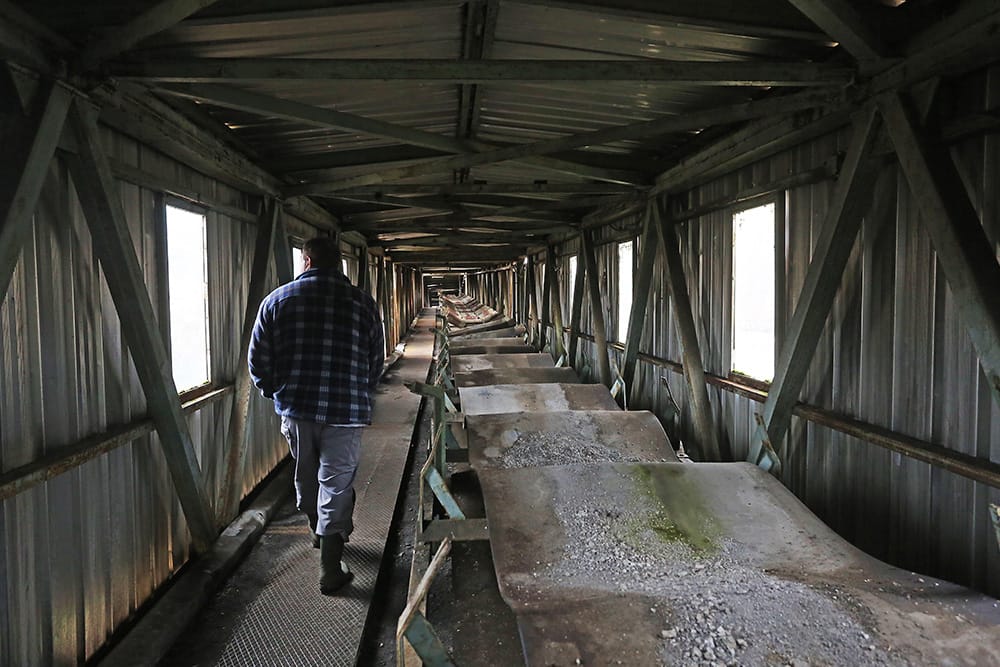
During the negotiations with the institutions of Una-Sana Canton, Lager promised to invest 10.5 million marks in coal exploitation. As security, they presented the authorities with a “Decision and Investment Plan for the Period 2014-2018”, a document they themselves annulled before the USC Government offered them a contract.
After signing the contract, Lager paid half a million marks in advance, thus covering the costs of a five-year fee for land use and coal mining. In five years, they mined 180,000 tons of coal, while before the war, up to 300,000 tons of coal were mined annually at the strip mine.
Bašić’s Lager owns the company C.E.M.P. in Croatia, which in 2017 took over the company “VE Gradina” from Tomislavgrad. This company has a concession and all the necessary permits for the construction of a local wind farm and is waiting for a building permit to start the works. The wind farm will pay concession fees only after it is put into operation, and should produce 143.6 GWh of electricity per year. That is about three percent of the total electricity consumed by households in BiH last year.
In Croatia, C.E.M.P. has a wind farm near Knin. The Bureau for Combating Corruption and Organized Crime (USKOK) is investigating C.E.M.P. on suspicion that its owner Milenko Bašić and director Dragan Stipić intended to bribe Josipa Rimac, the then State Secretary at the Croatian Ministry of Administration, to ensure that the wind farm received the necessary permits and be put into operation, although it did not meet all the conditions.
An investigation was launched into these events in May 2020, but no indictment has been filed yet.



